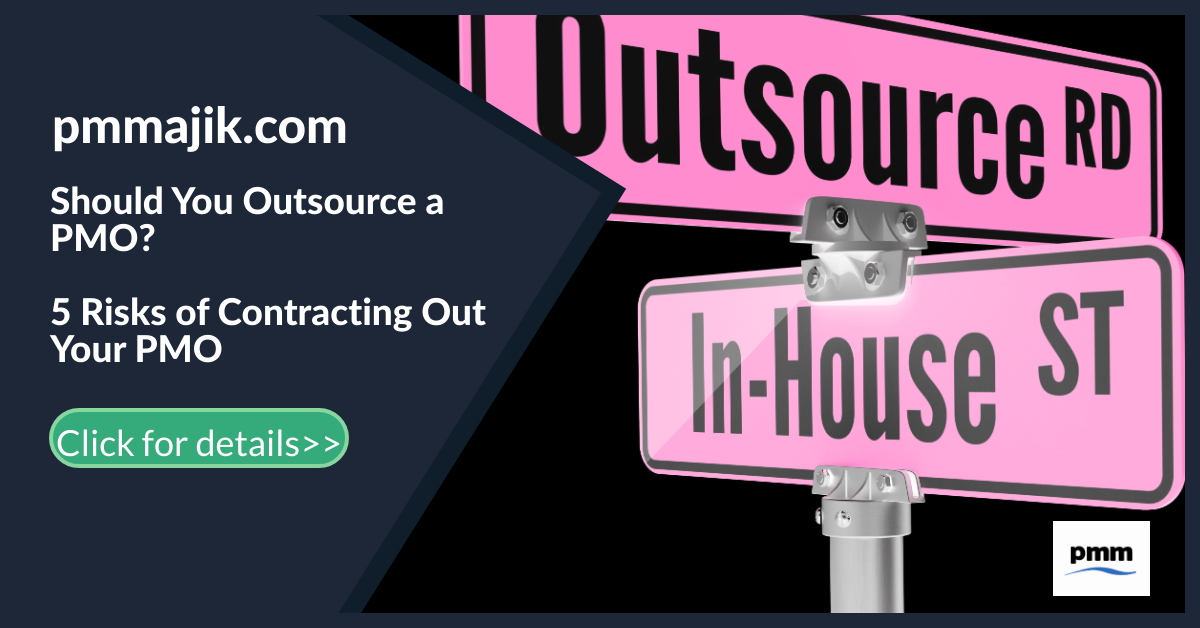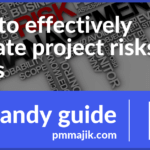The case for outsourcing business services is well-known, as are the risks – whether you’re looking at project management offices (PMOs) or a range of other non-core functions. There are specific risks to contracting out your PMO, so should you outsource it at all?
Where your PMO fits into your business is likely a big consideration when looking to contract out some or all of its functions. If your enterprise is project-led, e.g. software development, marketing, construction, then project management is a core function that you may not want to let go.
Whereas businesses that run projects to support wider progress, change, and transformation are generally better suited to outsourcing technical or full PMO activities. It’s not without risks, so we’re going to explore:
- How control and accountability is affected
- What the effect on your human resources is
- Where the disconnect comes in with outsourced PMOs
So you can be prepared and work to mitigate some of the bigger concerns.
1. You lose control of parts of your projects and business
Outsourcing your PMO can allow your business to focus on primary functions, but you may still need to have control of some aspects of the office to be successful. If your business changes strategy, develops new goals or has other business changes, you may find yourself in contract negotiations with your contractor.
Although this can be dealt with through good planning, there are other elements of a contracted PMO that you can’t control, such as:
- The people delivering your work and team changes
- The training they receive and skills and certifications they have
- The technology stack that gets used
A feedback mechanism to make small tweaks can also become cumbersome with a range of internal and external people involved.
2. There is less accountability for an external PMO
How much of an issue this will be will depend on the contract you have with your PMO service supplier. Of course, you’ll have SLAs, targets, and even KPIs set for your contractor, but how will these be enforced?
Financial penalties can be a double-edged sword – they’re the stick of the carrot and stick approach, and you’ll likely be wary of using them.
Without a way to hold your contractor truly accountable, you could see a decline in deliverables over time.
3. Your business doesn’t develop new skills
Few businesses can grow without a solid team behind them. When you outsource your PMO functions, you’re accepting that you’re not going to grow your projects team beyond what you have now.
That being said, outsourcing can be a stop-gap whilst you work to recruit the right people – but this needs to remain a priority if that’s your plan.
Even if you only outsource administrative functions like data collection, process support, and reporting, you’ll not then have junior roles to be able to promote from in the future. You’ll always need to look externally for PMO talent without basic functions running in-house.
4. Partners will lack a strategic awareness of your business
The contractor you use for PMO services is there to deliver reports, implement processes, and ensure frameworks and methodologies are followed. There is little reason for them to care how that fits into your wider corporate strategy.
The focus will always be on the deliverables you’ve agreed rather than how it contributes to the business as a whole. In contrast, keeping PMO functions in-house means your team has buy-in to the business and what the projects and governance are working towards.
5. There is a potential for a cultural disconnect with offshore partners
This is mainly an issue when you decide to use offshore PMO contractors – those based in a different country to your business. There can be huge benefits of tapping into global markets, but it’s not a perfect solution.
For example, if your business is based in the UK and you decide to outsource part of your PMO processes to a USA-based company, some issues you may come across include:
- A different culture in terms of working hours, workers’ rights, and overtime
- A different understanding of business hierarchy and how departments interact
- A disconnect in language and tone of communications
- Conflict resolution being handled differently
Plus, there are the age-old issues of time zones and different public holidays to contend with.
Should you outsource your PMO?
Whether you should outsource your PMO and take on the five risks of contracting services we have looked at will depend on the functions you want to outsource, how integral projects are to your business, and how well you can mitigate issues such as control, HR, and accountability.





